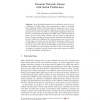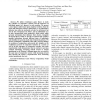1817 search results - page 37 / 364 » Extensive Games as Process Models |
106
click to vote
CORR
2007
Springer
15 years 2 months ago
2007
Springer
A virtual plague is a process in which a behavior-affecting property spreads among characters in a Massively Multiplayer Online Game (MMOG). The MMOG individuals constitute a synt...
122
click to vote
SIROCCO
2010
15 years 4 months ago
2010
Many distributed systems can be modeled as network games: a collection of selfish players that communicate in order to maximize their individual utilities. The performance of such ...
117
click to vote
CVPR
2010
IEEE
15 years 11 months ago
2010
IEEE
Surface registration is a fundamental step in the reconstruction of three-dimensional objects. This is typically a two step process where an initial coarse motion estimation is fo...
142
click to vote
AMAI
2004
Springer
15 years 2 months ago
2004
Springer
We present systems of logic programming agents (LPAS) to model the interactions between decision-makers while evolving to a conclusion. Such a system consists of a number of agents...
156
Voted
IAT
2010
IEEE
15 years 15 days ago
2010
IEEE
We utilize evolutionary game theory to study the evolution of cooperative societies and the behaviors of individual agents (i.e., players) in such societies. We present a novel pla...



